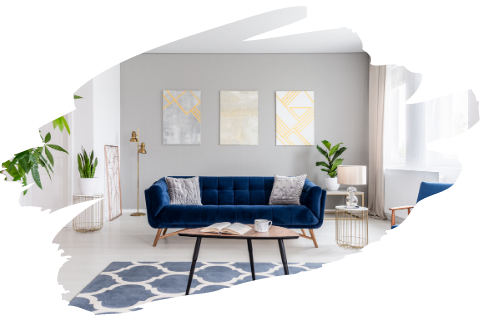Tips, Tricks and Ideas for Interior Painting

Tips, tricks, and ideas for interior painting
Do wash and repair your walls or project item before you begin. The prep work is time consuming but to have an unattractive item or have to redo the project because of a repair that should have been done is also time consuming and costly.
Don’t paint directly out of a can. Foreign material can drop into the paint and contaminate it causing discoloration and an unsmooth surface.
Do study a color wheel. Colors add mood and depth to a room.
Don’t hesitate to experiment with color. The most that can happen is you will have to choose another color and repaint.
Do bring a color chip home. These are available at home decorating stores or anywhere paint is sold. Look at the chip in natural and artificial light. You will be surprised at the difference the pretty chip in the store turned out to be in your own home.
Do rub a small spot with a small cotton ball dipped in ammonia. If the paint comes off it is latex, if not it is oil based.
Do buy a small can of paint and try the technique for interior painting you have chosen on a sample board or a small area of your project piece. Different woods, metals, and plaster or if you are painting over an already painted surface or wallpaper will emit different hues and shades that may or may not appeal to you.
Do use plastic wrap around door knobs, hardware and phones to keep splatters off. You can cover your eyeglasses with this to protect them.
Don’t store your paintbrush in the freezer. The bristles become brittle and the paint will not bind properly.
Do buy enough paint of the same lot number or color mixture to finish your interior painting project.
Do choose the right kind of paint. Latex paint is easy to use, dries quickly and cleans up with water. Latex has excellent adhesion to a variety of surfaces. Oil based paint is water tight. The colors are deep and saturated and resist fading in sunlight. Oil based paint takes longer to dry, can sag during application, and turn yellow with age. If the surface is not dry it will seal the moisture in and can cause rot. Oil based paints have fumes. The clean up is more complicated using solvents which are not good for the environment.
Do cover your furniture and floors with drop cloths. This will ensure time consuming clean up and damage to your furniture.
Do look and smell your paint that has been stored. A mildew or earthy smell indicates there is mold growing. A rust line on the inside of the can or dried out paint should be disposed of. Any paint that has been frozen will not bind properly upon application even though it looks fine.
These tips and tricks for interior painting have helped me over the years. Hopefully they will help you.
